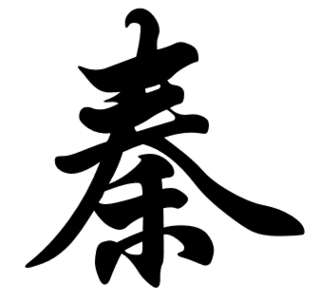Taiping, Tai-p’ing, or Tai Ping most often refers to:

Chen was a state founded by the Duke Hu of Chen during the Zhou dynasty of ancient China. It existed from c. 1045 BC–479 BC. Its capital was Wanqiu, in present-day Huaiyang County in the plains of eastern Henan province. Chen, the 4th most popular Chinese surname in the world, and members of the Hu clan, the 13th most popular Chinese surname in the world, would claim descent from the Duke Hu of Chen who was in turn descended from the legendary Emperor Shun. At its peak, Chen encompassed fourteen cities in modern-day Henan and Anhui.

Xie is a Chinese-language surname. lt is usually romanized as "Hsieh" in Taiwan. It is estimated that there are more than ten million people with this surname, most of whom live in Taiwan, Southern China, South East Asia, America, Europe and Africa. It is particularly common in Taiwan where it is the 13th most common surname in 2016. It is also very common in the east Asian diaspora which historically tended to have disproportionately emigrated out of southern China. A 2013 study found that Xie was the 23rd most common surname in China, with 0.79% of the population having this surname. In 2019 it was again the 23rd most common surname in mainland China. Most Xie are from southern China. It is the 34th name on the Hundred Family Surnames poem.
Fàn is a Chinese family name. It is also one of the most common surnames in Vietnam, where it is written as Pham, and occurs in Korea as Beom. It is the 46th name on the Hundred Family Surnames poem in Chinese.

Qín (秦) is a common Chinese surname. "Qin" is the hanyu pinyin romanization of the surname for Mandarin, the common dialect of China; other romanizations of the surname include Chin and Jin in Mandarin, Ceon and Cheun in Cantonese, and Tần in Vietnamese. People with this surname are most commonly found in Henan, Shaanxi, Shandong, Sichuan, Hubei and Hebei. It is the 18th name on the Hundred Family Surnames poem.

Emperor Taizong of Jin, personal name Wuqimai, sinicised name Wanyan Sheng, was the second emperor of the Jurchen-led Jin dynasty of China. His era name was "Tianhui" (天會). During his reign, the Jin dynasty conquered the Khitan-led Liao dynasty. He then led the Jin in their campaigns against the Song dynasty, captured the Northern Song capital in 1127 and went on to rule most of northern China. After his death, he was posthumously honoured with the temple name Taizong by his successor, Emperor Xizong.
The Qing dynasty (1644–1912) of China developed a complicated peerage system for royal and noble ranks.
The Duke of Fan refers to the titular heads of two different dukedoms in historical China, both romanized in the same way in Hanyu Pinyin.
Gong is the pinyin romanization of several distinct Chinese surnames, including 宫, 龔, 共, 公, 鞏, 功, 貢, and 弓. It may also be an alternative transcription of the surname Kong, or the Jyutping romanization of the Chinese surname Jiang.
Gong County may refer to:

Lì is the pinyin romanization of the Chinese surname written 厲 in traditional characters and 厉 in simplified characters. It is also spelled Lai according to the Cantonese pronunciation. It is listed 247th in the Song dynasty classic text Hundred Family Surnames.
Duke Hu of Chen was the posthumous title given to Gui Man by his father-in-law, King Wu of Zhou, who founded the Zhou dynasty in 1046 BC. Duke Hu was the founder of the Chen state, a dynastic vassal state of the Zhou dynasty located in modern-day eastern Henan.
Guangwu was the posthumous name of Liu Xiu, first emperor of the Eastern Han dynasty in China.
Pingchang or Ping Chang may refer to:
Gong gong, Gonggong, or Gong Gong, may refer to:
This page is based on this
Wikipedia article Text is available under the
CC BY-SA 4.0 license; additional terms may apply.
Images, videos and audio are available under their respective licenses.




